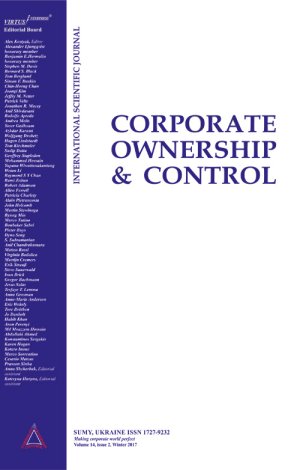
-
 Journal menu
Journal menu

- General information
- Editorial Board and External Reviewers
- Journal Policies
- Publication Ethics and Malpractice Statement
- Instructions for authors
- Paper reviewing
- Article processing charge
- Feedback from stakeholders
- Journal’s Open Access statement
- Order hard copies of the journal
- 50 most cited papers in the journal
INFLUENCES OF PROPRIETARY AND POLITICAL COSTS ON DISCLOSURE OF DIRECTORS’ AND EXECUTIVES’ REMUNERATION AND OWNERSHIP
Download This ArticleDennis Taylor
Abstract
Remuneration to, and ownership by, directors and top executives (D&Es) of listed companies have been subjected to calls for transparency as part of the corporate governance movement. Using the annual reports of 161 Australian listed companies, this study investigates the comparative impacts of proprietary and political information costs on management ‘s voluntary disclosure decisions concerning D&Es’ cash-based and equity-based remuneration, termination benefits, related-party transactions, shares held, and changes in ownership in their company. A firm’s investment opportunity set (using both market-based and accounting-based measures) is treated as a proxy for proprietary costs, while media attention and shareholder activism are used to proxy for political costs of voluntary disclosure. Results of this study provide evidence of the relative importance of two major types of information costs, proprietary and political, in influencing management’s (i.e., D&E’s ) decision concerning the extent to which they disclose sensitive details of their remuneration and ownership.
Keywords: Director and Executive Remuneration, Proprietary Cost, Political Cost, Investment Opportunity Set, Media Attention, Shareholders’ Activism
How to cite this paper: Taylor, D. (2008). Influences of proprietary and political costs on disclosure of directors’ and executives’ remuneration and ownership. Corporate Ownership & Control, 5(4-1), 173-185. https://doi.org/10.22495/cocv5i4c1p2

















